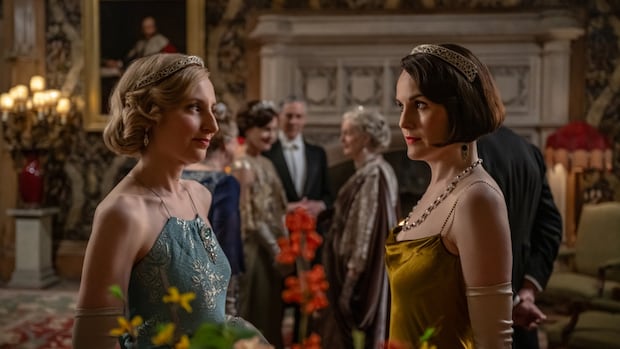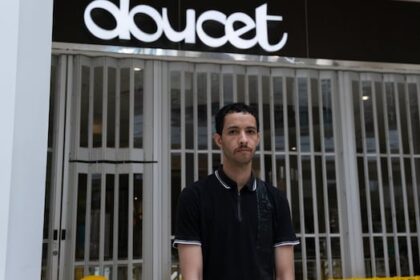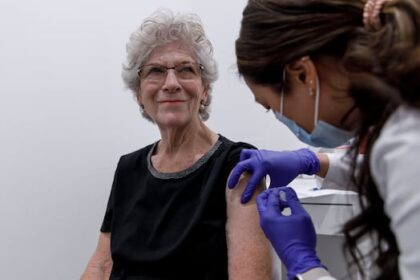Day 6Your brain on period dramas: The psychological appeal of shows like Downton AbbeyAfter 15 unforgettable years, the grand doors of Downton Abbey have officially closed. With the release of Downton Abbey: The Grand Finale in theaters last Friday, the beloved and acclaimed historical drama has come to an end — and fans around the world are bidding an emotional farewell. But the genre itself, experts say, isn’t going anywhere anytime soon.”I think it has a really potent role in our society now — maybe more so than it ever has before,” cultural historian Madeleine Pelling, who is based out of the U.K., told CBC’s Day 6.Since the show’s debut, the series has transported viewers into the intrepid lives of the fictional aristocratic Crawley family and the loyal servants who share their home — all set against the backdrop of sweeping social and political upheaval in early 20th-century England. It’s a saga of love, loss, war and scandal — and it’s made a lasting mark on television history. Pelling, whose research focuses on how history is interpreted and retold in the present day, said she was drawn to the show’s ambitious historical scope. Robert Crawley, the Earl of Grantham, and his wife Cora, the matriarch of the Crawley family, in Downton Abbey: The Grand Finale. (Rory Mulvey/Focus Features )”At the beginning, we’re pre–First World War and the Titanic’s just sunk, and you’re situated in this golden age world where everything is rosy and fine for these very wealthy people,” said Pelling.”Over the next three decades, that’s completely taken apart and reassembled. You’re following these characters through all of these cultural and economic changes.”Timeless appeal Period dramas have long held a cherished place in popular culture — from Jane Austen adaptations to BBC classics — and in the streaming era, their global popularity has only grown.Netflix’s Bridgerton, with its sumptuous reimagining of Regency period in London, has become one of the platform’s most-watched shows. For Linda Barnard, a culture writer and longtime fan of historical fiction, these stories offer more than just drama — they’re immersive and educational experiences.While watching Vikings, which charts the brutal and epic journey of Norse leader Ragnar Lothbrok, she says she could almost feel herself among the warriors.”I felt cold, wet, [and] the exhilaration of being on the long boat and out there with Ragnar Lothbrok.”Another standout for her was Shōgun, a sweeping historical epic based on James Clavell’s 1975 novel, set in Japan in the year 1600 at the end of the Sengoku period and on the brink of a century-defining civil war. “I found so many things to learn about Japan through that series,” said Barnard. Liz Coleman, left, and Linda Barnard, right, are fans of historical dramas. (Submitted by Liz Coleman and Linda Barnard)For Liz Coleman, part of the appeal of historical dramas lies in its antiquated pace — and what that slower rhythm can teach us today.She’s fascinated by how much of life used to be about waiting: for letters to arrive, for news to travel, for change to unfold. That built-in slowness, she says, gave people time to grow emotionally and connect more deeply through the ability to “yearn” for things. “In our day now, we can pretty much get anything we want very quickly,” said Coleman, a registered therapeutic counsellor in B.C. “And so, we almost have an intolerance to waiting.” ‘Psychological comfort foods’ Pamela Rutledge, a media psychologist in California, says these shows can actually be good for your mental health. She calls them “psychological comfort foods,” offering soothing reprieve amid the noise of the world and the personal stresses that weigh us down everyday. She says historical dramas like Downton Abbey, with their candlelit ballrooms, sprawling estates, and rich period details, aren’t just beautiful to look at — they also invite us into a more ordered world, engage our imagination and provide a kind of emotional sanctuary. India Amarteifio as Young Queen Charlotte, Corey Mylchreest as Young King George in episode 101 of Queen Charlotte: A Bridgerton Story. (Liam Daniel/Netflix)”You’re looking at things and you’re imagining enjoying them, you’re imagining experiencing them,” Rutledge said.Unlike reality TV — which she says often leaves viewers feeling like they’re falling short — stories from a bygone era create just enough distance for viewers to feel inspired by what they see, rather than be bogged down by comparison. “You’re not beating yourself up because you’ll never be a duke,” Rutledge said. “You’re really enjoying the visceral experience, not comparing it to something that you feel like you should have.”Learning from the past Historical dramas may be rooted in the past, but they speak volumes about the present.Pelling, who co-edited the forthcoming book The 18th Century Today: Literature and Media from Beauty and the Beast to Bridgerton, says that the genre has “changed so much and for the better.”She says some of these productions now challenge assumptions of the past, and share stories which were historically marginalized. “Audiences now expect to see that diversity,” said Pelling. Period shows like Roots and Chief of War don’t just recreate historical settings, says Pelling. They reveal the complex legacies those histories have left behind. Te Kohe Tuhaka as Namake, Mainei Kinimaka as Heke and Te Ao o Hinepehinga as Kupuohi in Chief of War. (Apple TV+ )Roots, the landmark miniseries released in 1977, traces the lineage of an African American family from enslavement to emancipation, confronting viewers with the generational trauma of slavery. Chief of War, which premiered in August 2025, brings to light Indigenous histories in the Pacific that Pelling says have long been overlooked or distorted.Set in late 18th-century Hawaii, the series puts Indigenous voices and perspectives at the centre, exploring themes of sovereignty, colonization and cultural survival . “The period drama always reflects the time in which it’s made, and the concerns of the people making it,” Pelling said.”At the moment, because of our own political discourse, because of the time we’re living through, we are more attuned to these inequalities and the legacies of the past that we’re still living with.”Over Downton Abbey’s six television seasons and three movies, Rutledge says the show brought both the opulent halls upstairs and the bustling servants’ quarters below to life. She says it has effectively immersed viewers in a richly woven tapestry of human experience that explores universal themes like “family dynamics, workplace relationships [and] romantic entanglements.” In the show’s finale, Hugh Bonneville, as Robert Crawley, 7th Earl of Grantham, walks with Downton Abbey as his stately backdrop. ( Rory Mulvey/Focus Features)Beyond mere guilty pleasures, says Rutledge, these stories deserve more credit than they often get. “It’s actually very good for you, right?” she said.
Downton Abbey says goodbye, but the genre endures. Why can’t we stop watching period dramas?











